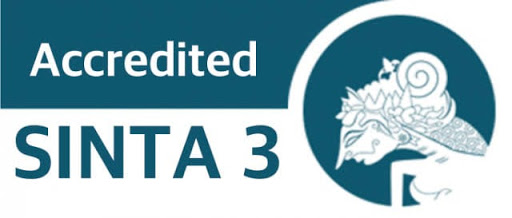Implementation of monitoring and evaluation of BPI Bandung high school library
DOI:
https://doi.org/10.30742/tb.v7i2.2995Abstract
In its management, the library must be carried out monitoring and evaluation activities to see whether it has met the information needs of the people in the organization or institution. This monitoring and evaluation activity can be in the form of an assessment of services, collections, facilities, infrastructure, and library staff. Here I chose the BPI Bandung High School library as my place to conduct monitoring and evaluation activities on its collections. This research aims to monitor and evaluate the BPI Bandung High School library groups using the Formative-Sumative model. The method used is a descriptive qualitative approach. The techniques used are observation, interview, and documentation techniques. This research concludes that the BPI Bandung High School library is by the standard library criteria in Indonesia. It's just that the collection procurement and stock-taking can be maximized again.References
Arifah, M. N. (2023). Tantangan komunikasi informasi dan peluang pustakawan dalam menjaga eksistensi kegiatan literasi informasi perpustakaan perguruan tinggi di masa pandemi. Jurnal Ilmu Perpustakaan, 9(4), 1-10.
Binnendijk, A. L. (2019). Donor agency experience with the monitoring and evaluation of development projects. Methods for social analysis in developing countries, 165-184.
Brusco, N. K., & Frawley, H. C. (2019). Program evaluation within the research translation framework. J Physiother, 65(2), 63-4.
Castro, M. D. B., & Tumibay, G. M. (2021). A literature review: efficacy of online learning courses for higher education institution using meta-analysis. Education and Information Technologies, 26, 1367-1385.
Ghazinoory, S., & Aghaei, P. (2021). Differences between policy assessment & policy evaluation; a case study on supportive policies for knowledge-based firms. Technological Forecasting and Social Change, 169, 120801.
Idrus, L. (2019). Evaluasi dalam proses pembelajaran. Adaara: Jurnal Manajemen Pendidikan Islam, 9(2), 920–935.
Iskandar, F. A., Iskandar, I., & Wijayanti, L. (2022). Kompetensi pustakawan dalam manajemen pengembangan koleksi di perpustakaan perguruan tinggi: Tinjauan literatur sistematis. Jurnal Ilmu Perpustakaan (JIPER), 4(2).
Kamal, K., & Rasyid, M. N. A. (2023). Evaluasi moderasi beragama pada program wawasan kebangsaan di pondok pesantren As' adiyah Sebatik. PETITUM, 11(1), 25-34.
Kooli, C. (2019). Governing and managing higher education institutions: The quality audit contributions. Evaluation and program planning, 77, 101713.
Natapraja, Z. R., Sinaga, D., & Yanto, A. (2020). Kegiatan pengembangan koleksi perpustakaan Kineruku. IQRA: Jurnal Perpustakaan dan Informasi, 14(1), 94-111.
Nurmalia, R., Winoto, Y., & Yanto, A. (2019). Evaluasi koleksi berdasarkan pada metode yang Berpusat Pada Penggunaan (Use-Centered Method) studi kasus pada perpustakaan Universitas Muhammadiyah Tasikmalaya Provinsi Jawa Barat. Libraria, 7(1), 163–184.
Ruslin, R., Mashuri, S., Rasak, M. S. A., Alhabsyi, F., & Syam, H. (2022). Semi-structured Interview: A methodological reflection on the development of a qualitative research instrument in educational studies. IOSR Journal of Research & Method in Education (IOSR-JRME), 12(1), 22-29.
Sharma, A. K. (2019). Knowledge management and new generation of libraries information services: a concepts. African Journal of Library and Information Science, ISSN, 001-007.
Sitopu, Y. B., Sitinjak, K. A., & Marpaung, F. K. (2021). The influence of motivation, work discipline, and compensation on employee performance. Golden Ratio of Human Resource Management, 1(2), 72-83.
Solarino, A. M., & Aguinis, H. (2021). Challenges and bestâ€practice recommendations for designing and conducting interviews with elite informants. Journal of Management Studies, 58(3), 649-672.
Stedman, R. C., Connelly, N. A., Heberlein, T. A., Decker, D. J., & Allred, S. B. (2019). The end of the (research) world as we know it? Understanding and coping with declining response rates to mail surveys. Society & Natural Resources, 32(10), 1139-1154.
Wahyuni, S. (2020). Evaluasi kinerja Sistem Informasi Perpustakaan (SIPRUS) menggunakan analisis PIECES ditinjau dari persepsi pustakawan (studi kasus perpustakaan UIN Sunan Kalijaga Yogyakarta). Tibanndaru: Jurnal Ilmu Perpustakaan dan Informasi, 4(1), 68-82.
Yuliani, T. (2020). Analisis kebutuhan pemustaka pada kegiatan layanan pengembangan koleksi buku Perpustakaan IAIN Batusangkar. Al-Kuttab: Jurnal Kajian Perpustakaan, Informasi dan Kearsipan, 2(1), 41-52.
Yuniar, S. R., Margana, H. H., & Hadiapurwa, A. Pengembangan koleksi perpustakaan di Telkom University Open Library. Jurnal Pustaka Ilmiah, 7(1), 36-44.
Zheng, J., Lam, A. H. C., & Chiu, D. K. (2023). Evaluating the effectiveness of learning commons as third spaces with the 5es usability model: The case of Hong Kong University of Science and Technology Library. In Third-Space Exploration in Education (pp. 123-143).
Downloads
Published
How to Cite
Issue
Section
License
Once an article was published in the journal, the author(s) are:
- granted to the journal right licensed under Creative Commons License Attribution that allows others to share the work with an acknowledgment of the work's authorship.
- permitted to publish their work online in third parties as it can lead wider dissemination of the work.
- continue to be the copyright owner and allow the journal to publish the article with the CC BY-NC-SA license
- receiving a DOI (Digital Object Identifier) of the work.


.png)

